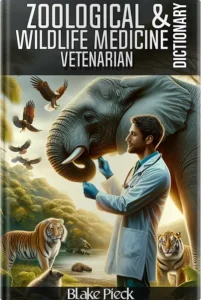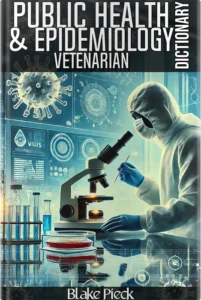The Marine Biology Dictionary delves into the mesmerizing depths of marine biology. Whether you’re a passionate nature enthusiast, a dedicated student, or an experienced marine biologist, this book is your indispensable guide to unraveling the mysteries of the ocean and its captivating inhabitants. Embark on an immersive journey across the expansive seas as you explore a treasure trove of marine life terminologies and definitions. From the vibrant ecosystems of coral reefs teeming with life to the enigmatic realms of the deep abyss, this dictionary spans a vast spectrum of topics, ensuring that you’ll discover answers to all your marine-related questions and curiosities.
The “Marine Biology Dictionary“ is an indispensable resource for anyone interested in the ocean and its inhabitants. Whether you’re a nature enthusiast, a student, a researcher, or a conservationist, this dictionary offers a wealth of knowledge to deepen your understanding of marine biology. By exploring the vast spectrum of topics it covers, you can enhance your appreciation for marine biodiversity, conduct informed research, and contribute to the preservation of our precious marine ecosystems. Invest in the “Marine Biology Dictionary“ and embark on a lifelong journey of discovery beneath the waves.
Why Invest in the “Marine Biology Dictionary“?
- Comprehensive Resource for All Levels
The “Marine Biology Dictionary“ is an exhaustive resource, meticulously crafted to cater to a wide audience, from novice enthusiasts to seasoned professionals. It covers an extensive range of marine biology topics, providing clear and concise definitions that are accessible to readers of all levels. This inclusivity makes it an invaluable tool for anyone looking to deepen their understanding of marine life and ecosystems.
- Enhance Your Knowledge and Understanding
Marine biology is a vast and complex field, encompassing diverse species, habitats, behaviors, and ecological interactions. This dictionary offers a wealth of knowledge on marine species, habitats, ecosystems, behaviors, conservation efforts, and scientific methodologies. By providing detailed explanations and definitions, it helps readers gain a comprehensive understanding of the intricate and interconnected nature of marine ecosystems.
- Ideal for Research and Study
For students and researchers, the “Marine Biology Dictionary“ is an essential reference tool. It delves into the intricacies of marine taxonomy, ecological interactions, oceanographic processes, and cutting-edge research findings that shape our understanding of marine life. The dictionary’s thorough and accurate definitions support academic work and research, making it a reliable source for assignments, projects, and scientific investigations.
- Foster Conservation Awareness
Understanding the marine environment is crucial for effective conservation efforts. This dictionary highlights the importance of marine conservation, providing insights into the challenges and strategies involved in preserving marine biodiversity. By fostering awareness and education, it empowers readers to contribute to conservation efforts and make informed decisions that benefit marine ecosystems.
- Explore Diverse Marine Habitats
The “Marine Biology Dictionary“ takes readers on a journey through various marine habitats, from the shallow coastal waters to the deep-sea trenches. It explores the unique characteristics and inhabitants of different ecosystems, such as coral reefs, mangroves, estuaries, and the open ocean. This comprehensive exploration helps readers appreciate the diversity and complexity of marine environments.
Key Sections of the “Marine Biology Dictionary“
- Marine Species
This section provides detailed information on a wide array of marine species, from microscopic plankton to the largest whales. It covers the classification, anatomy, behavior, and ecological roles of different marine organisms. Whether you’re interested in fish, invertebrates, marine mammals, or algae, this section offers a deep dive into the fascinating world of marine life.
- Habitats and Ecosystems
Explore the various marine habitats and ecosystems that make up the ocean. This section delves into the unique features of coral reefs, kelp forests, deep-sea hydrothermal vents, and more. It explains how different habitats support diverse communities of organisms and how they interact within the broader marine ecosystem.
- Ecological Interactions
Understanding the relationships between marine organisms is key to understanding the dynamics of marine ecosystems. This section covers topics such as predator-prey relationships, symbiosis, competition, and food webs. It provides insights into how these interactions shape the structure and function of marine communities.
- Conservation and Management
The conservation section addresses the critical issues facing marine environments today. It covers topics such as overfishing, habitat destruction, pollution, climate change, and marine protected areas. This section provides information on conservation strategies and management practices aimed at preserving marine biodiversity and sustaining healthy ecosystems.
- Scientific Methodologies
Marine biology relies on a variety of scientific techniques and methodologies to study marine life and environments. This section explains the tools and methods used in marine research, including remote sensing, genetic analysis, tagging and tracking, and ecological modeling. It offers readers an understanding of how marine biologists gather and analyze data to advance our knowledge of the ocean.
- Oceanographic Processes
Gain a deeper understanding of the physical and chemical processes that govern the marine environment. This section covers topics such as ocean currents, waves, tides, and nutrient cycling. It explains how these processes influence marine life and ecosystems, shaping the conditions in which organisms live and interact.
Who Can Benefit from the “Marine Biology Dictionary“
- Nature Enthusiasts
For those who love the ocean and its inhabitants, this dictionary provides a wealth of information to satisfy your curiosity. It enhances your appreciation for marine biodiversity and helps you understand the complex dynamics of marine ecosystems.
- Students and Educators
Students studying marine biology or related fields will find this dictionary an invaluable resource for their coursework and research. Educators can use it as a teaching tool to provide clear and accurate definitions and explanations of key concepts in marine biology.
- Marine Biologists and Researchers
Professionals in the field of marine biology can rely on this dictionary as a comprehensive reference for their work. It supports research by providing precise definitions and up-to-date information on a wide range of marine biology topics.
- Conservationists and Environmentalists
Those involved in marine conservation and environmental protection will benefit from the insights and information provided in this dictionary. It helps them understand the challenges facing marine ecosystems and the strategies needed to address them.
- General Readers
Anyone with an interest in the natural world and the ocean will enjoy exploring the “Marine Biology Dictionary.” It offers a fascinating glimpse into the diversity and complexity of marine life, making it a delightful read for general audiences.





















